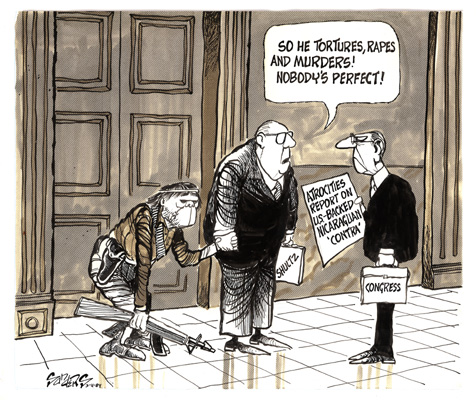'Ronald' Putin
Once upon a time there was a great power that was worried about its rival’s efforts to undermine it...

"There was a great power that was worried about its longtime rival’s efforts to undermine it. Its leaders thought the rival power was stronger and trying to throw its weight around all over the world. In fact, this longtime rival was now interfering in places the declining state had long regarded as its own backyard. To protect this traditional sphere of influence, the worried great power had long maintained one-sided relationships with its neighbors, many of them led by corrupt and brutal oligarchs who stayed in power because they were subservient to the powerful neighbor’s whims.
But suddenly, a popular uprising toppled the corrupt leader of one of those client states, and he promptly fled the country. The leaders of the uprising seemed eager to align with the great power’s distant rival, in part because they admired the rival’s ideology and wanted to distance themselves from the neighbor that had long dominated their much-weaker country. In response, the tough-minded conservative leader of the now very worried great power ordered his government to arm rebel groups in the former client state, to prevent the new government from realigning and eventually to drive it from power."
Stephen Walt hits the nail on the head in his latest piece for Foreign Policy here. The great power in his story is, of course, the United States, not Russia; the leader is Ronald Reagan, not Vladimir Putin; and the unfortunate neighbour is Nicaragua, not Ukraine.
I urge you to read Walt's excellent piece. It helps to put the 'moral and diplomatic clarity' that American politicians use to justify an open war with Russia into its true historical perspective. If we want to understand Putin in Ukraine, we should recall Reagan in Latin America, not Hitler, Stalin and General Tojo.

"There was a great power that was worried about its longtime rival’s efforts to undermine it. Its leaders thought the rival power was stronger and trying to throw its weight around all over the world. In fact, this longtime rival was now interfering in places the declining state had long regarded as its own backyard. To protect this traditional sphere of influence, the worried great power had long maintained one-sided relationships with its neighbors, many of them led by corrupt and brutal oligarchs who stayed in power because they were subservient to the powerful neighbor’s whims.
But suddenly, a popular uprising toppled the corrupt leader of one of those client states, and he promptly fled the country. The leaders of the uprising seemed eager to align with the great power’s distant rival, in part because they admired the rival’s ideology and wanted to distance themselves from the neighbor that had long dominated their much-weaker country. In response, the tough-minded conservative leader of the now very worried great power ordered his government to arm rebel groups in the former client state, to prevent the new government from realigning and eventually to drive it from power."
Stephen Walt hits the nail on the head in his latest piece for Foreign Policy here. The great power in his story is, of course, the United States, not Russia; the leader is Ronald Reagan, not Vladimir Putin; and the unfortunate neighbour is Nicaragua, not Ukraine.
I urge you to read Walt's excellent piece. It helps to put the 'moral and diplomatic clarity' that American politicians use to justify an open war with Russia into its true historical perspective. If we want to understand Putin in Ukraine, we should recall Reagan in Latin America, not Hitler, Stalin and General Tojo.

 Jako dvanáctiletá odjela do Sovětského svazu. Po devíti letech se vrátila v uniformě
Jako dvanáctiletá odjela do Sovětského svazu. Po devíti letech se vrátila v uniformě Masáže nebo výuka golfu. Dětský certifikát zakáže i činnosti nesouvisející s dětmi
Masáže nebo výuka golfu. Dětský certifikát zakáže i činnosti nesouvisející s dětmi Patnáct lekcí, které jsme se naučili během pandemie
Patnáct lekcí, které jsme se naučili během pandemie Deník dobrovolníka: Jak se pracuje s drony u rozvědky
Deník dobrovolníka: Jak se pracuje s drony u rozvědky Ukrajinský deník: Proč mají v Užhorodu Čechy rádi
Ukrajinský deník: Proč mají v Užhorodu Čechy rádi

